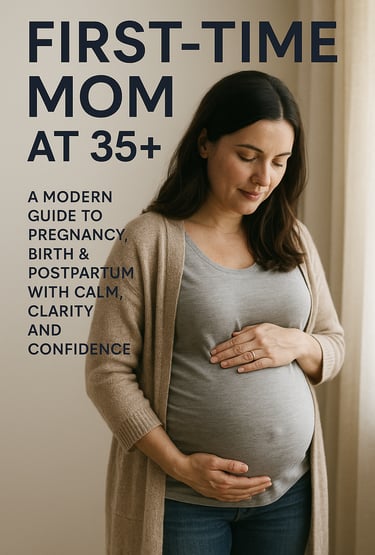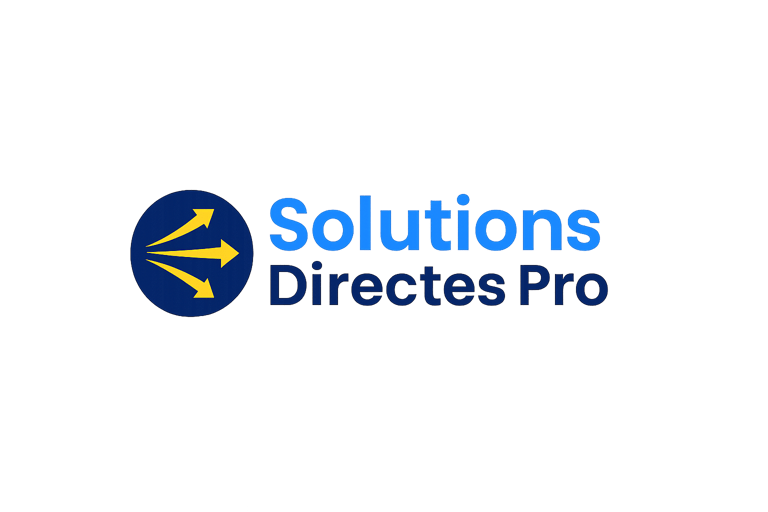Becoming a First-Time Mom at 35+: The Ultimate Guide to a Calm, Confident & Healthy Pregnancy (2025/2026 Edition)
Millions of women today begin motherhood in their mid-30s or early 40s — and the trend keeps rising worldwide.
But while the internet focuses mostly on risks, what women truly need is clarity, emotional support, and practical tools adapted to adult life.
If you want a complete resource that addresses your reality, you can explore the full premium guide here:
👉 https://payhip.com/b/dIPrH


Why More Women Are Becoming First-Time Moms at 35+
Motherhood after 35 is no longer the exception — it’s the new normal.
🟢A global shift in demographics
Women today have more education, more career control, more financial stability, and more freedom to choose the right moment to start a family.
🟢What really changes biologically at 35
Yes, fertility decreases with age — but it decreases gradually, not suddenly at midnight on your 35th birthday.
The key is informed, calm, evidence-based preparation, not panic.
For deeper guidance, emotional tools, and checklists built specifically for your age group, see the full guide:
👉 https://payhip.com/b/dIPrH
The #1 Challenge for Women 35+: The Mental Load
Most guides talk about medical risks.
Few talk about the real burden:
managing work and life
emotional grounding
systems to reduce overload
modern digital tools
realistic planning
and a guide that understands adult life
planning medical appointments
balancing hormones, mood, and sleep
preparing your home
organizing postpartum
navigating family expectations
keeping your relationship strong
The mental load is heavier after 35 because your life is fuller —
and that’s exactly why you need systems, scripts, checklists, and support.
All of these are deeply addressed in the premium ebook:
👉 https://payhip.com/b/dIPrH
How to Feel More Confident During Pregnancy After 35
🟢Understand your personal health landscape
Online articles oversimplify. What matters is your medical profile, not your age alone.
🟢Build your support circle
You don’t need everyone — you need the right people.
🟢Protect your emotional balance
Pregnancy after 35 requires emotional clarity, boundaries, and energy protection.
The ebook gives you scripts, tools, routines, and an entire emotional toolkit:
👉 https://payhip.com/b/dIPrH
Postpartum After 35: What No One Tells You
The Fourth Trimester hits differently at 35+.
🟢Your body needs more intentional recovery
Hormonal stabilization takes longer.
Sleep loss hits harder.
Healing requires patience + strategy.
🟢Your identity evolves
Motherhood after 35 transforms your confidence, boundaries and emotional world.
🟢You must lower the mental load
Checklists + routines + delegation systems = essential.
All these systems are fully developed inside the full guide:
👉 https://payhip.com/b/dIPrH
The Best Tools, Apps & Checklists for Women 35+
If there is one thing that changes everything for older first-time moms, it’s organization supported by digital tools:
✔ Pregnancy tracking
Ovia • What to Expect • BabyCenter
✔ Emotional well-being
Calm • Headspace • Expectful
✔ Mental overload management
Notion • Trello • TimeTree
✔ Breastfeeding & bottle-feeding
LactApp • Huckleberry • The Wonder Weeks
✔ Sleep guidance
Pezzi • Baby Sleep Site
The ebook includes curated lists, QR links, and ready-to-use checklists:
👉 https://payhip.com/b/dIPrH
Why Pregnancy After 35 Is Also a Strength
Older mothers bring:
emotional intelligence
resilience
stability
career clarity
strong boundaries
deeper introspection
powerful intuition
These qualities create a motherhood experience that is grounded, intentional, and deeply nurturing.
The Most Helpful Guide for First-Time Moms at 35+ (and Why)
If you want a complete resource that covers:
Body & hormonal changes
Emotional health
Anxiety management
Mental load reduction
Relationship balance
Postpartum recovery
The Fourth Trimester
Nutrition & routines
Scripts for doctors / partner / family
Checklists, planners, and real-life tools
Then the “First-Time Mom at 35+” ebook is the most complete guide available in 2025.
👉 Download it instantly here:
https://payhip.com/b/dIPrH
What Makes This Guide So Unique
✔ Not fear-based
Pure clarity. No medical panic.
✔ Modern
Apps, tools, strategies, neuroscience.
✔ Holistic
Emotional + mental + physical + relational.
✔ Written for adult women
Not generic advice for teenagers.
✔ Worldwide-focused
USA, Canada, UK, Australia, New Zealand included.
✔ Actionable
Checklists, scripts, planners, systems.
Every chapter is designed to reduce stress and increase confidence.
Ready to Start This Journey With Clarity & Calm?
Download your complete premium guide here:
👉 https://payhip.com/b/dIPrH
If you want:
a peaceful pregnancy
emotional stability
a strong postpartum
a grounded identity as a mother
a healthier relationship
less overwhelm
more confidence
and practical support at every stage
Then this ebook will become your most valuable companion.
🟣 Final Thoughts
Motherhood at 35+ is not late —
it is aligned.
You are not behind.
You are exactly where you are meant to be.
And you deserve a guide that understands the real you —
the woman, the mother, the human being in transformation.
👉 Full guide here:
https://payhip.com/b/dIPrH
🟣 FAQ — First-Time Mom at 35+
❓ Is it safe to have my first baby at 35 or older?
Yes. Most women in their mid-30s and 40s have healthy, normal pregnancies.
What matters more than age is your overall health, your prenatal monitoring, and how well you support your emotional and physical well-being.
If you want a clear, non-fear-based explanation of risks, tests, and emotional tools, refer to the full guide:
👉 https://payhip.com/b/dIPrH
❓ What are the most common challenges for first-time moms over 35?
The top challenges include:
balancing work, life, and pregnancy
managing the mental load
regulating anxiety and emotional shifts
understanding prenatal tests
preparing for postpartum recovery
adapting identity and relationships
All these topics are explored in-depth in the premium ebook created specifically for women 35+:
👉 https://payhip.com/b/dIPrH
❓ Does fertility drop drastically at 35?
No. Fertility declines gradually, not suddenly.
Age is one factor among many, including sleep, stress, hormones, lifestyle, and ovulation patterns. Understanding your personal health picture matters far more.
❓ What can I do to increase my chances of a healthy pregnancy after 35?
You can:
optimize sleep and nutrition
understand your cycle
manage stress effectively
take prenatal supplements
stay active safely
follow a calm, structured prenatal routine
The ebook provides tailored tips, routines, and checklists.
❓ What prenatal tests should I expect at 35+?
Most women are offered:
NIPT (Non-Invasive Prenatal Testing)
anatomy scan
glucose screening
optional genetic counseling
Understanding these tests reduces anxiety and helps you prepare with confidence.
❓ Is postpartum recovery harder after 35?
It can be — not because you’re “older”, but because your body and hormones need more intentional care. Recovery at 35+ benefits from:
deeper rest
structured support
realistic expectations
pelvic-floor awareness
mental load reduction
The ebook includes checklists and recovery plans to make this phase easier.
❓ How can I manage pregnancy anxiety as a first-time mom at 35?
Try:
breathing routines
grounding exercices
reducing information overload
building a support circle
creating a calm morning & night routine
using apps for emotional health
A full chapter of anxiety-reducing tools is included in the guide:
👉 https://payhip.com/b/dIPrH
❓ What makes pregnancy after 35 emotionally different?
Women 35+ often:
think more deeply
feel more responsible
carry more mental load
bring more emotional maturity
experience bigger identity shifts
This is normal — and can even be a strength with the right support.
❓ Should I worry about the term “advanced maternal age”?
No. It’s an outdated medical label used for insurance and classification.
It does not mean your pregnancy is unsafe.
Modern science shows that most women 35+ have healthy pregnancies.
❓ How can I prepare mentally and emotionally for motherhood at 35+?
The best strategies include:
reducing the mental load
preparing your partnership
setting boundaries
creating support systems
organizing postpartum in advance
understanding hormonal changes
These are pillars of the ebook designed for women exactly like you:
👉 https://payhip.com/b/dIPrH
❓ What are the best tools or apps for pregnancy after 35?
Recommended apps include:
Ovia
What to Expect
Expectful
Calm
Notion (for mental load)
TimeTree (for couple planning)
The guide provides complete lists and ready-to-use systems.
❓ How do I prepare my relationship for becoming parents later in life?
Focus on:
communication scripts
expectation alignment
mental load distribution
intimacy shifts
weekly check-ins
shared responsibility systems
